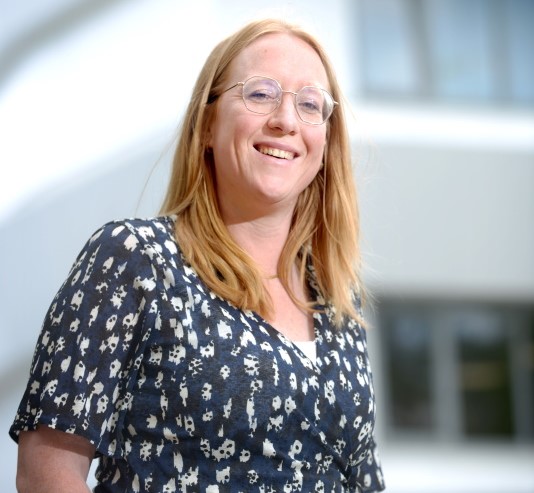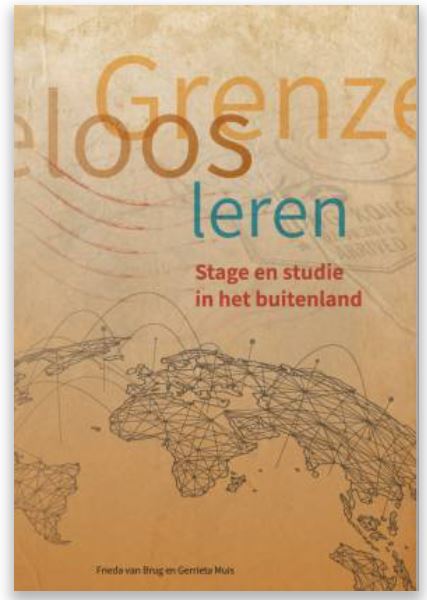Studying abroad. An immersion in an often completely different culture. Plenty of pitfalls, but he who pays good enough attention will learn real life lessons. Frieda van Brug and Gerrieta Muis can write a book about it.
Your book ‘Grenzeloos studeren’ (‘Studying without borders’) is full of tips for students who are about to leave. But you never know in advance whether you are really going to get something out of it…
Gerrieta: ‘That’s right. I don’t think you can really set quality requirements and test them beforehand – I think something becomes a good internship or study if you, as a student, look at what is coming your way with an open mind.’
Frieda: ‘We have strict professional training here, with matching competencies. It is often very different abroad. But that doesn’t mean it isn’t educational. Specifically for a foreign internship, I would say that you should learn from every aspect. With a narrow vision (“I want to learn this”) you exclude many other experiences. You can gain experiences that don’t fit your initial picture but are still very valuable. For example, a nurse may discover that during the internship she is much more concerned with education and communication than “working in a hospital”. She did not know that beforehand, but it can still be very informative.’
So you should specifically ask yourself afterwards: what have I learned?
Gerrieta: ‘That is essential. Once they have returned, the student needs support: how do you translate those experiences into your future work? Overthinking all those thoughts, you can’t do that if you’re still in the middle of it.’
But suppose you only see outdated methods there, and outdated equipment…
Frieda: ‘That can still be educational. It often starts with personal growth, and then how you translate that growth to you as a professional. That is where the greatest learning experience lies. And as a study programme, as a university of applied sciences, we are responsible for helping them with this transition.
I believe that realization may be delayed.
Gerrieta: ‘A former student once sent me a letter saying ‘was this all?’ six months after her stay abroad. But much later he wrote again because he realized how much it had helped him. He had become more confident and communicatively stronger. His experiences just needed time to “settle in”. In that respect, the semester system is not convenient…’
But if the result is unpredictable, what can you do as a teacher in advance?
Gerrieta: ‘You can facilitate it by arranging good guidance on the spot, and occasionally asking stimulating questions. But it is also important that you discuss their motives with the students beforehand. Is this the right time? There can be many reasons to wait a little longer. Sometimes it’s really good to go. It is up to the teachers and student career counsellors to take a closer look at this, together with the student.
Frieda: ‘I recently spoke to a student who wanted to go abroad, but his relationship had just ended. I asked the supervisor for advice, talked to the student once more – and then we came to the conclusion that this was exactly the right time to do this. We almost sént him away: we grant you this opportunity!
It’s no secret that some students get complete stuck abroad, for example because of language problems.
Frieda: ‘You must not forget that students who go to Belgium, for example, due to a lack of knowledge of a foreign language, can also have to deal with an unpleasant culture shock. It seems so close, so familiar, but there are also important differences.”
Gerrieta: ‘It is precisely in those kinds of destinations that students are often not prepared for that, and then things can clash.’
The clash can be of such significance that you no longer have to expect a positive effect…
Frieda: ‘As long as you take the time and space for it as a student, and you manage to adapt your behaviour, it will be super educational!’

Are students sufficiently aware of this?
Gerrieta: ‘The first motivation for students to choose a country is that it appeals to them enormously. They expect it to be nice and cozy there, beautiful and exciting. Often that’s all.
Some have a plan or an idea of what they would like to do there – that was certainly the case when we ran real job interviews for Vietnam and Uganda. They sometimes came up with proposals whereafter we immediately realized: you shouldn’t do that in Vietnam, we have the ideal place in Uganda for that! That was a bit of a switch for them, but it always went well.”
‘The experience sometimes gets lost in superficial anecdotes.’
Gaining educational experiences, does that really have to happen tens of thousands of kilometers from home?
Frieda: ‘It doesn’t really matter where you are, as long as you are taken out of your comfort zone and learn to hold your own in a completely different context. This has always been the criticism of the concept of “intercultural competences”. It seems to be about interpersonal competences, but it is more than that. The advantage of a completely different context is that something like this speeds up the growth process enormously. If you are really taken far out of your comfort zone, it works like a pressure cooker.
Gerrieta: ‘We once visited a university in Uganda with a large group of social work students. What they discovered was that there are hardly any social safety nets in Uganda and that social workers there really stand up for the weak. Something that happens much less in the Netherlands. The Ugandan students are really trained in this. That was very educational to see.”
Frieda: ‘One of our students from the Business, Media and Law Division went on to do an internship in Uganda and set up his own company there. There is so little legislation and regulation there, that’s just possible… the sky is the limit. So he has been able to do everything that comes with it. That would never have happened here in the Netherlands. Here he would have watched, there he could actually do it. But there are limits. When we heard that a nursing student was being asked to perform a Caesarean section, we had to intervene. A nurse is not allowed to do that here, so not there either. There was no fault in the guidance there; they simply look at it from a different viewpoint: they quite soon see a doctor in a nurse. But the student was faced with a dilemma. Should I do that? Is it wise to say no? That was a learning experience…’
‘Students have to learn how to deal with power relations.’
I seems very difficult to reject your superiors at such a moment.
Frieda: ‘Students have to learn to deal with that. And you have to “see” the power relations. That is why a curious, open and inquiring attitude is crucial. If this is missing, important clues will be ‘missed’. Like the time nurses were wearing the wrong color uniforms. When we came to visit, we saw uniforms in different colors and asked what that meant. The students had never thought about that, but those colors certainly had a meaning within the hospital.’

And the other employees hadn’t corrected them?
Gerrieta: ‘Communicative misunderstandings are very common. Students see that they are not looked in the eye and think ‘I am certainly not welcome’, while if you ask further, it appears that others do not dare to look at them because they feel inferior, or are afraid that their English is not sufficient.’
And then after a few months they come home and have to get right back to work.
Gerrieta: “They often have to. Then the experience gets lost in no more than superficial, often negative anecdotes. How beautiful it was, what difficulties they have had, how poor it they are, the frictions….. That applies especially to the free movers, the students who go on their own initiative.
They would like to stay as long as possible, preferably the entire semester, and come back at the start of the new semester. They have to get right back to work and have no time to think about their experiences.”
Frieda: ‘If you don’t pick up on that as a study programme or university of applied sciences, then that is a missed opportunity, which is a great pity. Students have to learn to put their experience into words, to place it within the context of their field: what does it all mean to for me?’
And only then such a journey has really been useful.
Frieda: ‘Recently I ran into a former student in the schoolyard, where I came to pick up my children. She now has children, just like me, her studies are already eight years behind her, but she recognized me immediately and came up to me. She wanted to tell me that her experiences abroad had really been a life-changing experience for her. “I still realize, she said, “what impact that has had on me.”’
Frieda van Brug is teacher and contact person for internationalization for the study programme Social Work and country coordinator for the minor ISD (International Sustainable Development).
Gerrieta Muis is a Social Work teacher and coordinator for the minor Onbegrepen Gedrag (Misunderstood Behavior).
Grenzeloos studeren has been published by Van Gorcum publishers and costs €27.50.

Text: Marcel Hulspas
Photo: Jasper van Overbeek Illustration: Judy ballast
